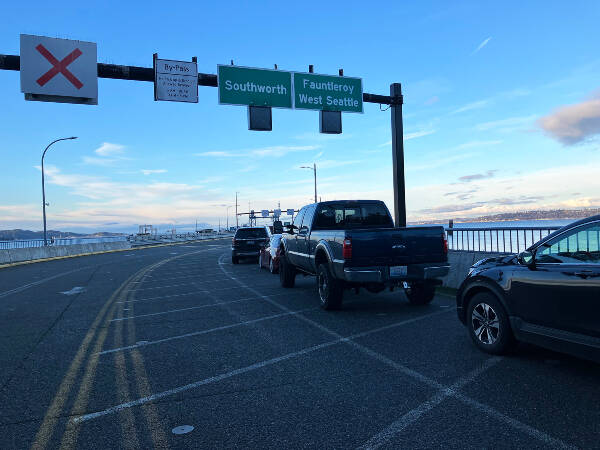Washington State Ferries plans to restore ferry service to the Triangle Route to pre-pandemic levels within the next few months, as vessel and staffing availability allows.
Ferry officials delivered this news on Jan. 11 at this year’s first system-wide community meeting.
Seven WSF leaders gathered on Zoom to hear from riders and share updates for the coming year. More than 200 people attended, from up and down Puget Sound, with more than 20% attending from the Fauntleroy-Vashon-Southworth Triangle Route.
A similar meeting also took place the next evening, with updates at both meetings spanning a range of topics, including service restoration, capital projects including the Fauntleroy ferry dock, a new passenger code of conduct, staffing and state funding.
Patty Rubstello, WSF assistant secretary, announced the news about the return of the third boat, which many islanders have longed for since WSF cut service throughout its system in the fall of 2021 when facing a staffing crisis.
“Service restoration is WSF’s biggest focus,” she said.
Ferry officials say they have prioritized restoration to routes based on ridership, service performance, travel alternatives, and vessel and crew availability.
Currently, WSF is trialing service restoration on the Edmonds-Kingston route. Once that service is deemed restored, the Triangle Route will be next, Rubstello said. When the Fauntleroy-Vashon-Southworth route completes its trial phase and reaches 95% reliability, it will be considered fully restored as well.
Because of staffing and vessel variables, Rubstello said she could not provide a more specific estimate for when the Triangle Route’s third vessel might return — beyond that it is next and should happen within the next few months.
The Seattle/Bremerton and Port Townsend/Coupeville routes will come later, as will the Anacortes/Sidney, B.C. route, which will not resume until June at the earliest, Rubstello said.
Later in the meeting, Director of Planning, Customer and Government Relations John Vezina conveyed a sense of urgency around the topic, as meeting participants in other communities sought answers for their service restoration timelines.
“There is no one, other than the people you are looking at, who want [more] to get all these routes restored as soon as possible,” Vezina said. “I know if you live on Vashon and have two boats at one end and one boat at the other, getting to medical appointments and getting to and from work is really challenging.”
The Fauntleroy dock project is still in its planning phase, and Rubstello said WSF has narrowed the options for the new dock down to two: Keep the dock at its current size and location, or replace it with a dock that would hold 124 to 186 vehicles.
“Both alternatives could be designed to minimize and/or avoid effects to the near-shore environment and nearby Cove Park,” she said.
Cove Park is the small park next to the West Seattle dock; there was a campaign to save it and prevent WSF from expanding into it.
Since the spring of 2021, WSF has received more than 700 comments from members from the three affected communities, Rubstello noted.
Fielding a question, David Sowers, WSF terminal engineer, said there is a project at Southworth that is “largely funded” for a second slip, but there are currently no plans to add a second slip to the new Fauntleroy dock. However, he added, in this planning phase, WSF is trying to find the “best fit” for the project.
“If we find adding a second slip has operational advantages, like overhead loading or other improvements at the terminals, that is something we will certainly consider. I can’t make any promises, though,” he said.
Sowers also noted that WSF is conducting studies to determine how climate change will affect the ferry system.
When building a new trestle, such as at West Seattle, project officials will ensure that it meets the changes associated with climate change. The dock, like other WSF projects, will be designed to withstand the next 75 years, including earthquakes, tsunamis and sea level rise.
As the planning process continues, Rubstello said WSF will continue engaging the three related Ferry Advisory Committees and the communities the terminals serve to gather input before completing the planning and environmental linkages study by the end of the year.
WSF’s aging fleet is among the challenges the agency is facing.
In fact, Rubstello said that three vessels, the Yakima, Tillicum and Kaleetan, were supposed to be retired this year, but their life will be extended until new hybrid vessels are built and in service. Construction of the first vessel will begin later this year; it is expected to enter service in 2027 on the Mukilteo and Clinton routes.
Ferry riders will also soon notice the rollout of WSF’s new passenger code of conduct, which Rubstello said was needed, due to unacceptable behavior by riders, including using abusive, racist and misogynistic language with employees.
“It is not only unsafe, but it has become an issue with retaining our current employees and a barrier to hiring the diverse workforce we need to restore regular service across the system,” Rubstello said.
Under the new system, unruly passengers will receive a yellow card – similar to when soccer players commit infractions and are warned about their behavior. WSF yellow cards will warn riders that if they do not abide by the code of conduct, Washington State Patrol may bar them from the ferries for a certain amount of time.
During the course of the 90-minute meeting, Rubstello and her colleagues spent considerable time talking about other important elements of WSF’s work, including its efforts to increase staffing and the funding for WSF included in Gov. Jay Inslee’s proposed budget before the Legislature this session.
To listen to the full recording of the meeting, see tinyurl.com/2p8fdkdu. To provide comments to WSF, email WSFComms@WSDOT.WA.GOV.
To communicate with the island’s Ferry Advisory Committee, email VashonFAC@gmail.com.
—Susan Riemer is a former editor of The Beachcomber.


